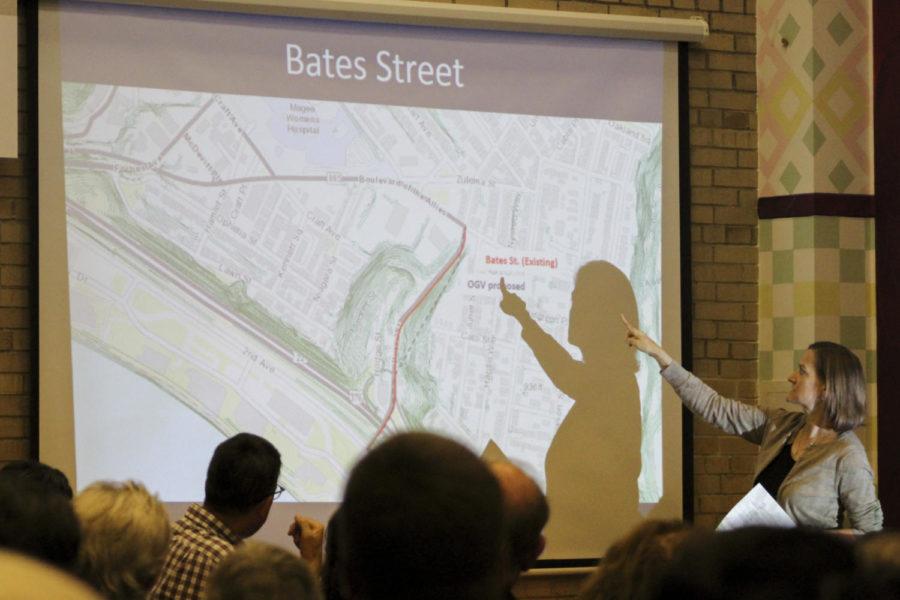City Council President Bruce Kraus asked if, by chance, anyone from the development group Oakland Gateway Venture was in attendance at a town hall Thursday evening. William Bannow, whose presence was unknown for the first hour of the meeting, stood up to defend his company against Oakland residents’ criticisms.
OGV bought a strip of properties on the 3400 block of Bates Street in 2014, which the company has said it plans to turn into an apartment complex. But the company’s ambitions grew, and it now wants to build a 3,000-car garage and an office space, widen Bates Street and rework the Interstate 376 ramps in the process. About 70 community members packed into a small room at the Oakland Career Center on Semple Street to express concern about the development to a panel of officials.
At the start of the meeting, Wanda Wilson, the executive director of the Oakland Planning and Development Corporation, announced that a formal representative from the development group opted out of the meeting days before. Bannow said he came to solely observe the meeting, explaining that after OGV did a formal presentation for the City in June and had a follow-up meeting three months later in October, the City said they did not like the plan.
“We’re in the process of rethinking the project,” Bannow said.
State Sen. Jay Costa said “truthful dialogue” was important in these conversations and one thing that stood out to him during the town hall was “a lack of trust.”
“I’m disappointed that the project folks have not been here. I have questions about whether or not this is a real viable project,” Costa said in an interview after the meeting. “It just seems to be a massive project that [I’m] not so sure is being thought out properly and I want to see more conversations along those lines.”
In a discussion led by Wilson, the group spoke about the logistical faults they say surround OGV’s $650 million development, beginning with the proposed alterations to the Bates Street corridor. OGV suggested widening and straightening the street — an idea Wilson deemed “completely unfeasible” because of zoning violations and the negative environmental impact it would have on the hillside area.
As principal transportation planner for the Department of Mobility and Infrastructure, panelist Justin Miller said widening roads would increase traffic speed, create longer intersections and have a negative effect on pedestrians.
“All of these contribute to highway-centric, automobile-centric design,” Miller said. “It’s inherently hostile to people who don’t have a two-ton metal cage around them.”
Community members expressed concern toward the poor upkeep of OGV’s 12 Bates Street houses — a vacant row of properties that sit near the Boulevard of the Allies. Wilson said the homes have had 29 separate cases against them in Housing Court in the past 18 months for violations related to accumulation of trash, unsafe vacant properties and excessive weeds and overgrowth.
For Oakland resident Zoe Lardas, 52, the development group’s insistence on pursuing the project in spite of widespread community opposition is troubling.
“If you want to be on the up-and-up, then you show up and answer questions and see what’s going on,” she said. “Don’t just not show up. That’s what leads to mistrust.”
One item OGV would need to get approved to start anything is a public-private partnership, a contract between the government and a private company. According to Mavis Rainey, executive director of the Oakland Transportation Management Association, OGV’s “P3” is currently pending the Pennsylvania Department of Transportation’s approval.
Kraus, who represents the area of the proposal, made clear that officials engaged in obligatory courtesy meetings with OGV, but conveyed no support for the project.
“This project, in its entirety, as presented to our planning department, has been flatly rejected by the city,” Kraus said.
During the town hall, one resident recalled a community meeting in 2014 in which an OGV presentation included names of City and state officials, making some residents think those people supported the project. Kraus interjected.
“They’re going through all these back channels, making false claims. That traffic said this or planning said that or this elected said this,” Kraus said. “Nothing, nothing will happen without a fully vetted community process.”


